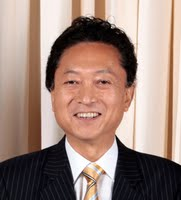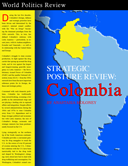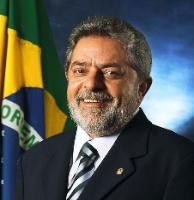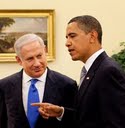Steve Clemons of the New America Foundation and national security reform expert Jim Locher discuss how the chain of command that is described in the Goldwater-Nichols Act could be expanded to include inter-agency systems. Locher says that the White House is currently lacking an integrated effort between agencies that would allow departments to share expertise.
Domestic Politics Archive
Free Newsletter
As China prepares to mark 60 years of communist rule, one of thegreatest challenges facing the country’s rulers remains uniting China’sdiverse ethnic groups, as recent unrest in Tibet and Xinjiang provincedemonstrates. Ninety-two percent of China’s 1.3 billion people areethnic Han Chinese,while the rest consists of a mix of 55 officially recognizedethnic minorities, from Mongols and Manchus, to Tibetans andMuslim Uighurs. Al Jazeera’s Melissa Chan reports from Sichuan province.

TOKYO — Days after being formally elected Japan’s new prime minister, Yukio Hatoyama hit the diplomatic ground running, traveling to New York last week to deliver a speech at the U.N. meet on climate change, before heading to Pittsburgh for the G-20 summit. The trip was widely viewed as a success, with Reuters saying Hatoyama handled his diplomatic debut with “aplomb.” The Japan Times praised his “strong” start, particularly his pledge to slash Japan’s greenhouse gas emissions by 25 percent on 1990 levels. The headline-grabbing promise on emissions is just the latest sign, according to veteran Japan commentator Karel van […]

In addition to potential effects on Germany’s economic, energy, and foreign policies, the results of the Sept. 27 national elections raise questions about the future of Germany’s longstanding practice of military conscription. Although Chancellor Angela Merkel’s Christian Democratic Union (CDU) continues to support compulsory military service more than any other major German party, her preferred new coalition partner, the quasi-libertarian Free Democratic Party (FDP), opposes it. Unlike most other NATO countries, Germany stubbornly adheres to the principle of compulsory military service. At present, all male German citizens are subject to nine months of conscription in the Bundeswehr (the German armed […]

In recent years, Brazil has put forward a more ambitious foreign policy with the aim of expanding the country’s presence in global economic negotiations, multilateral institutions and regimes, and regional affairs. [1] An active presidential diplomacy has spearheaded this approach, concerned with simultaneously deepening ties with the industrialized economies and the emergent South. Relations have been reshaped with the United States and the European Union, ties have been deepened with China and India, South-South multilateralism has been renewed and an unprecedented presence in South America has been asserted. A diversified set of “external fronts” has also led to an innovative […]

During the last five decades, Colombia’s foreign, defense and strategic priorities have been driven and determined by the country’s internal armed conflict, with the “War on Drugs” becoming the dominant paradigm from the 1980s onwards. This, in turn, has defined Colombia’s relations with Latin America — particularly, in recent years, with its Andean neighbors, Ecuador and Venezuela — as well as its relationship with the United States and Europe. Colombia’s struggle to stem cocaine production, its fight against the drug cartels that sprung up around the drug trade, and its war against the largest and longest-running guerrilla insurgency in Latin […]

BERLIN — After four years of an uncomfortable alliance with the liberal Social Democratic Party marked more by inaction that by any major initiatives, German Chancellor Angela Merkel and her conservative Christian Democrat party won a sweeping victory in federal elections here yesterday, putting the legislative pieces in place to make significant policy changes in her second term. The pro-business Free Democrats pulled off a major upset, winning enough votes to form a grand coalition with the CDU. Meanwhile, the election marked a major defeat for the SDP, with party candidate Frank-Walter Steinmeier calling for a reassessment of the party’s […]

BERLIN — Just days ahead of Sunday’s general election that will decide the next German chancellor, there is a noticeable lack of interest among the public, the media, and even the candidates themselves,. The widespread indifference comes at a time when Germany nevertheless faces a number of difficult issues, including an unpopular war in Afghanistan and the country’s tenuous economic recovery. Christian Democrat (CDU) Angela Merkel, the sitting chancellor, has essentially chosen not to campaign. She has made few public statements other than that she would prefer to form a coalition with the more conservative Free Democrats over the liberal […]

Brazil celebrated Independence Day twice this year: once on Sept. 7, the anniversary of its independence from Portuguese rule, but also a week before, on Aug. 31, when President Luiz Inacio Lula Da Silva declared the country “free” from poverty’s dominion, delivered by oil. President Lula’s “New Independence Day” accompanied his government’s announcement of a proposed overhaul of regulations governing the country’s oil and gas industry. The new regulatory model, Lula said, would “allow the government to become the owner of the petroleum.” Specifically, the proposal dealt with Brazil’s effort to increase its regulatory and fiscal control over the development […]

When 200 tax inspectors made a surprise visit last week to the editorial offices of Clarin, one of Latin America’s largest newspaper and cable TV companies, it was clear that the simmering tensions between the media giant and Argentine President Cristina Fernandez had reached new heights. The day after the raid, the Clarin newspaper ran with the headline: “Official operation of intimidation against Clarin.” Regional press watchdogs and government critics were also quick to condemn the incident as an attack on press freedom in Argentina, part of what they claim is a wider campaign by the presidency to discredit and […]

The European Union’s 2007 Ascension Partnership with Turkey (.pdf) calls for Turkey to reform its laws to adapt them to the Law of the European Union. Among the required reforms is legislation to protect and expand the media’s freedom of expression, which has been stifled in Turkey by broad interpretations of the Penal Code — specifically a clause known as Article 301 — as well as simmering domestic tensions between secular Kemalist and Islamist groups. Freedom of the press in Turkey is protected under Article 26 of the Turkish constitution. In fact, censorship of the press was abandoned on July […]

The government of Iran struggled for decades to fit into the broader Middle East, and it has finally succeeded: It now sees its people principally as a source of instability rather than a source of legitimacy. Thirty years after the Revolution, the Iranian government has concluded that it is far better to anesthetize the population than mobilize it. It is a conclusion from which there is no turning back. The Middle East has no shortage of formerly youthful revolutionary regimes that have slunk into middle age. In decades past, coups in Egypt, Iraq and Libya all tossed out corrupt Western-oriented […]

Amid devastated Somalia, a country mired for two decades in unforgiving conflict, Somaliland glows as an ember of hope. A moderate peace has held for 10 years in the autonomous region, reflecting a decade of efforts to expand governance, security and social institutions. Yet, despite it being a minor success in a sea of failure, regional and international organizations will not grant Somaliland status as an independent state, or give it a seat at the international roundtable. As another transitional government in Mogadishu fractures in the face of insurgent forces, and the international community scrambles to update policy positions, Somaliland […]
A panel at the Center for Strategic and International Studies on Sept. 2 examinedthe Japan elections and their consequences for Asia and the UnitedStates. The panelists included Assistant Secretary of State for East Asian and Pacific Affairs Kurt Campbell, Steve Clemons of the New America Foundation, and Michael Green of CSIS. Related from WPR: Japan Elections: DPJ Promises Change, But Can it Deliver?Likely LDP Defeat Has Implications for Japanese Defense

TEL AVIV, Israel — The announcement that Israeli Prime Minister Benjamin Netanyahu plans to approve the construction of more housing for Jewish settlers in the West Bank was interpreted by many Western observers as a snub, in light of Washington’s demands for a settlement freeze. In Israel, however, some see Netanyahu’s move not as a rebuff of American policies, but quite the opposite: a sign that Netanyahu is preparing to give in to pressure from the United States and work with U.S. President Barack Obama. Netanyahu’s decision to approve construction of 455 new settler homes sparked criticism from the Obama […]
